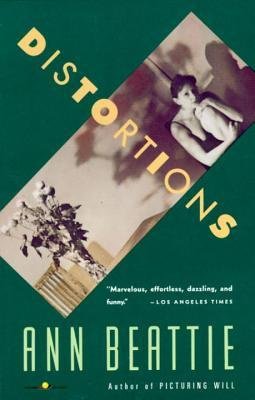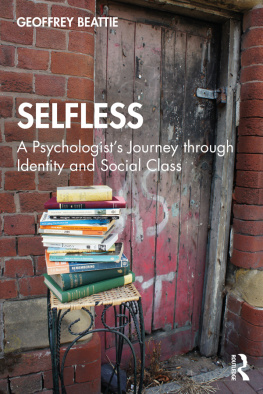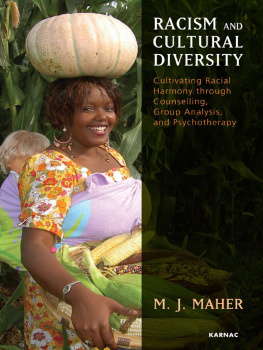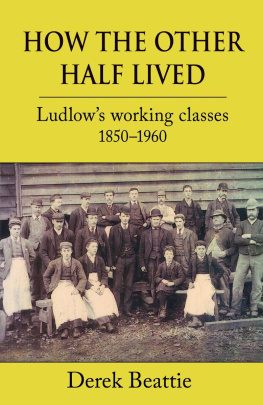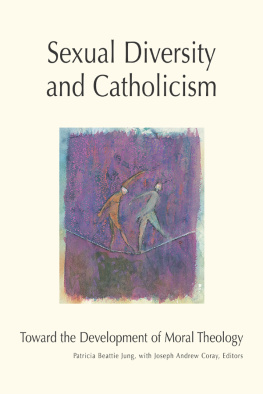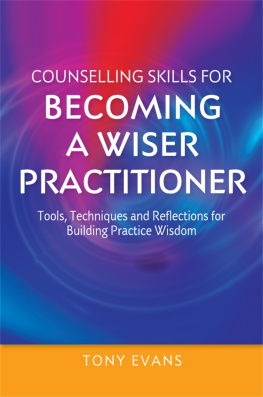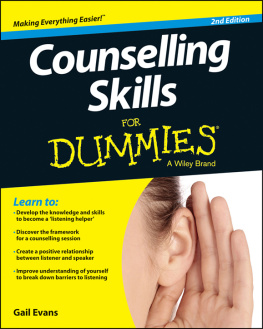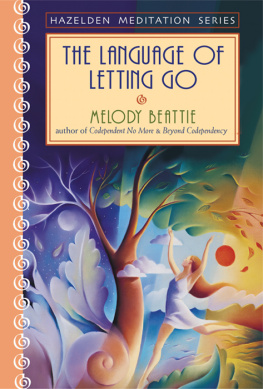SERIES EDITORS FOREWORD
The landscape of therapeutic practice is a constantly changing terrain that reflects current mental health concerns and increasingly diverse client populations. This, along with keeping up to date with the latest research in the field of mental health and good practice, poses considerable challenges for practitioners as they try to balance the demands of their practice with continuous professional development. The Essential Skills for Counselling Series is designed to provide clinicians, therapists, counsellors, health professionals, social care practitioners, and trainees with a range of tried and tested skills to enable them to enhance their practice. The emphasis is on exploring current changes in knowledge and practice which can be incorporated into their existing practice and theoretical model or orientation. The books in the series will focus on skills and techniques that are particularly useful when working either with particular client groups, such as survivors of childhood sexual abuse, or specific presenting symptoms such as complex trauma or shame.
Many practitioners are not always able to keep abreast of the latest research or be familiar with developments in practice and range of therapeutic techniques across different modalities. The handbooks in this series aim to provide current knowledge in working with particular client groups or specific mental health issues that practitioners may not have encountered in their original training. To enhance awareness and understanding the books will encourage practitioners to challenge their own perceptions and practice through self-reflection and a series of tried and tested exercises that they are invited to engage with and which can be used with clients.
The books in the series will be user friendly in using clear, accessible and easy to understand language with icons to signpost important points and good practice points. There will be boxes for experiential exercises and skills and exercises to use with clients. Practitioners will be able to dip in and out of the books as they need to enabling them access relevant information and skills without having to read extensively. To enliven the text case examples will be included to show how the skills can be employed. The focus throughout is on clear and succinct descriptions of skills, how they can best be employed and making the practitioner more aware of their own process in their work enabling them to become more sentient practitioners.
With the increased discourse on gender identity in response to estimates that around 1 per cent of the population are gender variant, it is critical that counsellors, therapists, and mental health professionals have the vital skills and information they need to be gender diversity literate and sensitive. This new addition to the series offers a timely and comprehensive introduction to how to work with gender diversity and identity. Through the unique balance of theory and practice, Michael Beattie and Penny Lenihan facilitate a deeper understanding of the complex issues in gender identity and how to work with the gendered self, gender variance, gender identity, and gender dysphoria.
Their book is packed with a wealth of clinical knowledge and a range of essential skills that will enable practitioners, trainees, and students to gain confidence when working with a diverse range of gender identities including masculinity, femininity, non-binary, trans, and cisgender. The emphasis throughout is on the need for affirmative practice in gender care and the process issues which most commonly arise in the therapeutic space, including the challenges that clients face in their daily lives and in the workplace when coming out, when transitioning, and in intimate relationships.
Through the combination of education, skills, reflexivity, case studies, and reflective exercises, the authors provide a much-needed book that equips practitioners with the knowledge and skills that facilitate good practice when working with gender diversity and gender identity that will be useful for professional development for all counsellors and psychotherapists, as well as trainees and students. It will also be a valuable addition to the literature on gender diversity and identity that would be of interest to other professionals including psychologists, psychiatrists, nurses, social workers, lecturers, and teachers, and anyone involved in mental health and well-being services.
Christiane Sanderson 2018
INTRODUCTION
Every part of our lives, whether were aware of it or not, is touched by gender identity and the cultural and contextual meanings made of it. However, perhaps because of the very pervasive nature of gendered experience, issues of gender dysphoria or even reflexivity around ones own gender identity are rarely covered in much depth in professional trainings. Instead, gender is either taken for granted or otherwise felt to be the preserve of experts and that, outside specialist gender clinics, general practitioners in the mental health field cannot or should not attempt to work with this population.
This book is about recognising that anxiety and providing practitioners with the skills and insights necessary to work effectively. It does not seek to make the reader a specialist. Instead, it is positioned as part of a drive towards affirmative practice in gender care, focusing on reflexivity and education. It gives an overview of the subject areas and process issues most likely to come up in counselling, and aims to balance the theoretical with the practical and to point to more detailed literature, should the reader want to explore a particular area in more depth.
As the series editor, Christiane Sanderson, suggested when first discussing the idea of writing a book for the Essential Skills for Counselling series: What would you have wanted to know about and be aware of on your first day working at Charing Cross GIC (Gender Identity Clinic)? Inspired by that question, we have approached the text with the assumption that, although our readership will be qualified and experienced practitioners, they may have had relatively little experience in reflecting on and working with issues of gender identity and gender variance in their clinical work.
WHY THE BOOK AND WHY NOW?
Discussions around transgender and gender non-conforming (TGNC) identities have become more frequent and salient in many Western societies in recent years, as reflected in the media, legislation, and social debates affecting people across the life span, in part because of several, high-profile celebrities coming out. Although often controversial, these celebrities have pushed questions of gender and gender identity into the forefront of mainstream media.
In addition, the gay rights movement has been largely successful in the West in promoting an agenda of equality. In the UK, for example, we have gone from the world of Section 28 (part of the Local Government Act that prohibited teachers to speak of homosexuality in the classroom as a pretended family relationship from 1988 until its full repeal in 2003; see Nixon and Givens, 2007), to full marriage equality with the Marriage (Same Sex Couples) Act 2013, a mere ten years later. Alongside the success in sexual politics, trans and other civil rights activists have been actively campaigning for gender equality. Although there has been some success at a legislative level, one only has to explore the heated debate around bathroom access in the USA over the last couple of years to see that trans peoples experiences in public spaces remain controversial and the fight for recognition and equality continues.




